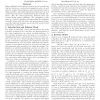Free Online Productivity Tools
i2Speak
i2Symbol
i2OCR
iTex2Img
iWeb2Print
iWeb2Shot
i2Type
iPdf2Split
iPdf2Merge
i2Bopomofo
i2Arabic
i2Style
i2Image
i2PDF
iLatex2Rtf
Sci2ools
DATE
2009
IEEE
2009
IEEE
Integrated scheduling and synthesis of control applications on distributed embedded systems
Many embedded control systems comprise several control loops that are closed over a network of computation nodes. In such systems, complex timing behavior and communication lead to delay and jitter, which both degrade the performance of each control loop and must be considered during the controller synthesis. Also, the control performance should be taken into account during system scheduling. The contribution of this paper is a control–scheduling co-design method that integrates controller design with both static and priority-based scheduling of the tasks and messages, and in which the overall control performance is optimized.
Related Content
| Added | 20 May 2010 |
| Updated | 20 May 2010 |
| Type | Conference |
| Year | 2009 |
| Where | DATE |
| Authors | Soheil Samii, Anton Cervin, Petru Eles, Zebo Peng |
Comments (0)

